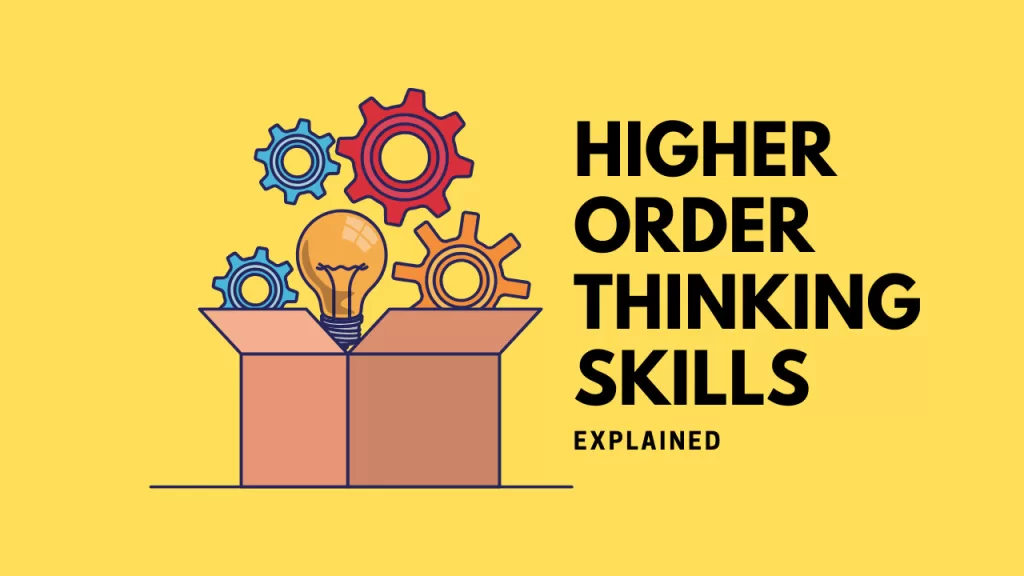
New clients, unlock 10% off all plans 🔥 at checkout with code: CEO10SPECIAL (Limited Time Offer)
New clients, unlock 10% off all plans 🔥 at checkout with code: CEO10SPECIAL (Limited Time Offer)






Are you equipped with essential higher order thinking skills sought by today’s employers?
In a fiercely competitive labor market, it is critical to utilize every advantage at your disposal to accomplish your career goals.
To achieve this, you must comprehend the skills and characteristics that employers prioritize when selecting new talent and ensure that your resume effectively showcases these capabilities to hiring managers.
Take, for instance, the paramount importance of higher order thinking skills in an economy that increasingly relies on knowledge.
Do you possess such skills?
In this article, we will elaborate on advanced learning and thinking, exploring why these proficiencies are of utmost significance in numerous knowledge-oriented occupations prevalent today.
Moreover, we will provide illustrative examples of higher order thinking skills and offer valuable tips to help you articulate these abilities within your resume.
Find out: Divergent Thinking: Should You Include this Skill on Your Resume?

Higher order thinking encompasses cognitive abilities that surpass mere memorization, repetition, and observation, as well as other basic thought processes.
It involves more advanced mental processes, such as the capacity to interpret data, derive logical inferences from available information, recognize interconnectedness between concepts, and tackle problem-solving.
Individuals who possess these higher order thinking skills tend to be rapid learners, effective decision-makers, and proficient in generating novel ideas and solutions.
Elevated thinking levels empower you to comprehend the world around you, organize and manipulate encountered facts and information, and apply that knowledge in meaningful ways to surmount challenges and make informed choices.
Consequently, this form of thinking serves as a valuable asset in academia, professional settings, and throughout your lifetime.
To grasp the true significance of these cognitive abilities for your professional journey, it’s worth contemplating the reasons behind employers’ eagerness to seek candidates proficient in advanced thinking.
Here are merely a handful of the myriad grounds for employers to highly regard your capacity for elevated cognition.
In this era of constant information flow, the presence of new technologies and systems permeates nearly every sector of the economy.
To truly contribute value to their employers, employees must possess the agility to swiftly adapt to emerging technologies and workflows.
As the economy progresses, employers will intensify their quest for individuals capable of information analysis, recognizing the interdependencies among seemingly disparate concepts, and leveraging that knowledge to generate innovative solutions within the workplace.
These cognitive abilities are utterly indispensable for any kind of groundbreaking progress – and employers will forever seek individuals capable of generating novel concepts and solutions.
Companies depend on imaginative personnel to uphold their innovative edge and competitiveness in the market.
The demand for individuals proficient in higher order thinking will persist, owing to their capacity to conceive and evaluate fresh ideas, experiment with theories, and tailor their concepts to meet the company’s requirements.
In the modern workforce, it is crucial for employees to possess the self-awareness required to accurately evaluate their productivity and outcomes.
These higher order thinking skills play a pivotal role in self-assessment. Individuals who possess such capabilities possess the knack for scrutinizing their efforts and achievements, pinpointing areas that need enhancement, and discovering superior methods to accomplish their objectives.
By doing so, they enhance both productivity and expertise.

Indeed, there exist various forms of higher order thinking abilities, all of which surpass the mere acquisition of information—an ability typically associated with lower-level aptitude.
Merely memorizing or assimilating knowledge marks merely the initial stage of learning and application.
Once the information is acquired, true comprehension must follow before engaging in higher-level cognitive processes.
Several primary categories of higher order thinking skills can be identified. These include the application of acquired information, analysis of data and facts, synthesis of ideas, and evaluation. When combined, these higher-order thinking skills equip individuals with the critical acumen necessary to thrive in the contemporary economy.
Let us explore how each of these advanced cognitive abilities influences one’s thought processes.
The act of applying what you’ve learned encompasses a range of skills that empower you to employ knowledge in novel situations, surmount obstacles, and tackle problems.
This process entails employing established principles and regulations, advancing theories, and utilizing concepts and efficient methodologies.
Effective application necessitates proficiencies such as:
The art of analysis holds immense value in the realm of critical thinking, serving as a vital skill of higher cognitive processes.
This aptitude entails a meticulous dissection of information, wherein data is meticulously broken down into its elemental fragments to unearth connections, underlying causes, and potential theories that beckon exploration in the quest for solutions.
Along the path of analyzing data, situations, and diverse information sources, the key lies in posing pertinent inquiries that stoke the fires of analytical thinking.
The repertoire of analytical skills encompasses:
Harmony is the power to perceive patterns and forge fresh amalgamations using fragments of information.
This skill set serves as a key catalyst for innovation, as it frequently paves the way for novel products, business notions, techniques, and methodologies.
Your higher order thinking skills enable you to interconnect diverse ideas, thereby engendering inventive solutions and enhancing antiquated products, services, and processes.
Here are some exemplifications of the skills employed in harmonization:
The capacity to evaluate and form judgments encompasses a range of skills that enable you to appraise information, generate hypotheses, assess data, and validate ideas and concepts.
By employing these skills, you can make informed assessments of each piece of analyzed information, determining its significance and worth.
This necessitates the exercise of sound judgment and logical reasoning, relying on evidence and rational thinking.
The process of evaluation not only allows you to absorb data but also empowers you to shape your own perspective on its importance.
Here are a few instances of this skill set:
Undoubtedly, possessing higher order thinking is essential. However, effectively communicating these skills to potential employers without overtly proclaiming yourself as a profound thinker is a whole different challenge.
It often proves to be one of the most intricate aspects of resume writing – exemplifying your capabilities rather than merely asserting them.
Fortunately, there exist effective strategies that can ensure your resume presents a captivating story, emphasizing your adeptness in higher-level thinking. Implementing these suggestions can significantly assist you:
In order to avoid explicitly labeling yourself as a “high-order thinker,” it is important to incorporate keywords that effectively convey your advanced thinking abilities to prospective employers.
By including relevant keywords specific to your job role and industry, you can effectively showcase your value to the organization.
To highlight your higher-level thinking skills and demonstrate expertise in your field, strategically incorporate these keywords throughout your resume summary, work experience, and skill sections.
To assist you in this process, we have compiled a list of higer order thinking skills that you can consider when selecting keywords for your resume:
These are just a few examples of the numerous skills you can incorporate as keywords in your resume.
To explore additional skills, we recommend checking out our informative articles, “How Do You Describe Analytical Skills on a Resume” and “Skills to Put on a Resume.”
As the initial part of your resume that hiring managers encounter, the resume summary plays a crucial role in leaving a lasting impression.
It is essential to ensure that employers read this summary and promptly recognize your capacity for higher-level thinking. To achieve this, incorporate language that showcases these skills.
The following example can serve as a guide for crafting your own personalized summary statement:
“A seasoned problem solver driven by data and evidence, with over 8 years of experience in data interpretation, trend analysis, and technical solutions. Proven record of leading a 20-person technical department overseeing IT solutions for projects exceeding $500 million in value. Known for my adept decision-making abilities, I am focused on effectively managing risk, cost, and cross-departmental communication to optimize organizational efficiencies, productivity, and profitability.”
Naturally, it is crucial to incorporate these essential terms into your professional experience section as well.
To accomplish this, you simply need to provide specific instances illustrating how you utilized these competencies to generate value for your employers.
Below each job listing, you can exemplify this with concise bullet points. Here are a few examples:
Make it a point to include a selection of essential higher order thinking skills within your skill section.
While you don’t have to include all of them, integrating a few of these capabilities into your skill list will effectively showcase your elevated level of reasoning.
As you construct this section, remember to refer to the job description to ensure that any required skills are also included.
Additionally, ensure that you incorporate these cognitive processes into your cover letter by sharing an example of how you utilized advanced thinking to accomplish a task or surmount a hurdle.
Whenever possible, substantiate the outcomes with tangible figures that exhibit the value you can bring to the employer.

In an ever-evolving economy driven by technological advancements and fresh ideas, employers are placing a growing emphasis on higher order thinking skills in their workforce.
To truly convey your exceptional thought processes on your resume, it is key to comprehend these cognitive skills and their positive influence on your job performance.
Are you effectively demonstrating your advanced cognitive skills to prospective employers? Discover the answer by downloading your free complimentary resume eBook today!
Share
Further Reading
*The names and logos of the companies referred to in this page are all trademarks of their respective holders. Unless specifically stated otherwise, such references are not intended to imply any affiliation or association with CEOMichaelHR.
Land interviews 3x faster while submitting fewer resumes
Copyright © 2025, ceomichaelhr.com.
All rights reserved.
Land interviews 3x faster while submitting fewer resumes
Copyright © 2025, ceomichaelhr.com.
All rights reserved.

Learn the same techniques our expert resume writers have used to get thousands of clients closer to their next job
Unlock expert resume tips, start landing multiple interviews!

Stay connected to receive powerful career insights, updates, and inspiration that’ll help you hit your career goals.